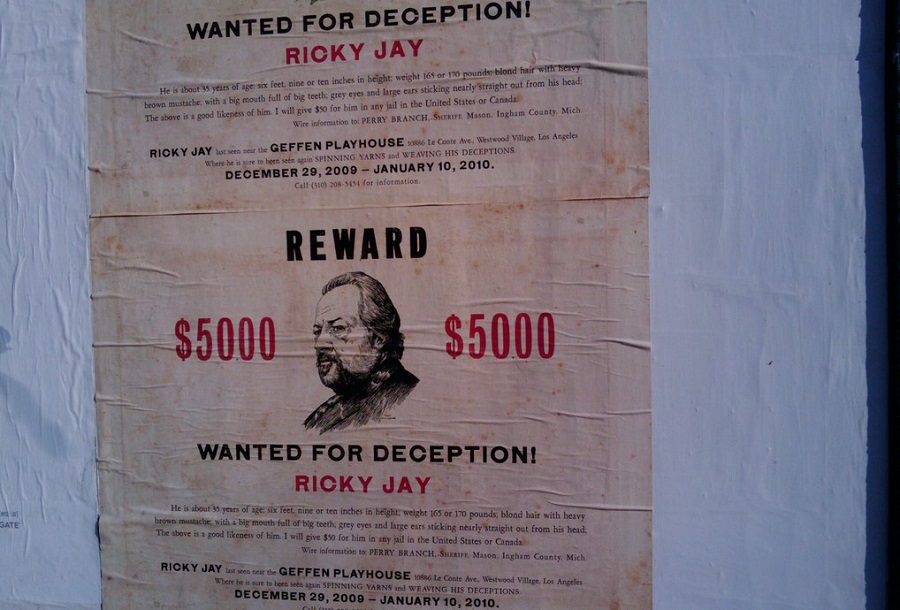Ingrid Richter photo
By
Zak Mucha
Oh, Lucky Me
(for Ricky Jay)
10 years old he switched the Colgate
and Brylcreem, proud of the simple
subterfuge between cabinet and sink,
seeing the first signals of something
(that knowledge existed between gestures)
uncertain and disappointed to be
the son of obedient routine.
To learn how to see what others couldn’t
he sought out Catskills magicians with names
once chopped, rounded, and Americanized
by Ellis Island lines, names refracted
again balancing the urge to stand
apart and remain within the crowd.
To see how hands could move he sought out
Vegas sharps who performed in silence
with names meant to be forgotten.
He created séances of mirrors
to slow time between bright spotlight gestures,
watched his own hands from every angle
until they belonged to a stranger.
One morning he woke up ambidextrous.
He learned not to look at the ghosts of his
hands unless he wanted others to see.
He disappeared himself, looking for a
way to master that invisible gap
between people where each space signified
possible truth between words. He wanted
to find the gap where nothing happens and
nothing is said. He wouldn’t talk about
his parents, but his sister was okay.
I saw him first at a card table
in a Mamet movie, lugubrious
and hooded when calling the last hand in
the United States of Kiss-My-Ass.
He said the lines right, dead bored and angry:
“What is this ‘marker’? Where are you from?”
Not stomping along with the beat, drumming
a bit ahead: “Who is this broad?”
or dragging behind: “Club flush. You owe me
six thousand dollars. Thank you very much.
Next case.”
Dismayed to see him giggling with talk show
hosts, I expected a stone-faced disruption of
the showbiz mutual non-aggression pact.
I wanted the Jungian shadow of
every magician, a criminal
carrying the fantasied grace and the
palpable rage of a child ignored
and a fake name so obvious it was
more real than birth.
He built his library and a thug took it —
dismissive of the cup-and-ball trick
depicted in hieroglyphics and the
history of the world infused with fools
or tricksters since the first owl-faced God
scratched on rock – a foreclosed car lot cleared
without a drop of sweat, just the brute force
of a world where math is not memory,
but the gravity of capitalism
where there is no illusion and no grace.
He held a bemused tolerance for the
year he was born and the years in which he
stood. The name discarded, a point of pride —
like being born in a car wreck.
Against that sadness, being outside time
was another trick to save himself.
A sold-out run at the Old Vic, the true
sharps never came backstage, but sat with their
new wives just off the center aisles.
He breezed through the differences between a
Vegas shuffle, a gin rummy shuffle,
and a child’s two-palmed scramble to always
find, as he said: “Oh, lucky me,”
the ace of spades yet again.
He quoted Seneca, Villon, and Shaw
between dead cuts, bottom and second deals:
“Every profession is a conspiracy against the laity.”
Audience members at each elbow he
made the queens and aces appear at will.
He simply knew where they were at all times.
A woman from the BBC told once
of his truculent participation
in documenting his own life,
(he refused to perform for her cameras)
making her job more difficult than it need be.
Lunch in LA, he chose the restaurant,
pissed her off all day, and then, as the
waiter took the laminated menus away
from the glaring sun of the corner booth,
made a block of ice appear between them.
She didn’t know why she burst into tears.
She asked: “Why did you do this to me?”
He shrugged: “I lie for a living.”
Zak Mucha
Zak Mucha, LCSW, is a psychotherapist in private practice and an analytic candidate at the Chicago Center for Psychoanalysis. Previously he supervised a community mental health program working with persons suffering severe psychosis, substance abuse issues, and homelessness. His most recent book is Emotional Abuse: A manual for self-defense.



No Comments Yet!
You can be first to comment this post!